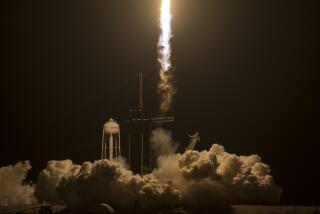Malfunction Thwarts Docking of Lab With Soviet Space Station
- Share via
MOSCOW — The Soviet Union reported Sunday that it was unable to dock its first space laboratory with its orbiting Mir station because of a failure in the lab’s control system.
The laboratory module, called Kvant, came within 200 meters (about 218 yards) of docking ports on the manned space station, the official Tass news agency said.
However, the approach was aborted during the final stage of docking “owing to an irregular function of the control system of the astrophysical laboratory Kvant,” Tass said.
The terse, three-paragraph report was one of the few times in recent years that the Soviet Union has acknowledged a setback in its space program.
“At present, telemetric data are being analyzed,” Tass quoted the mission control center as saying. “A decision on further work with the module will be taken on the strength of results of the analysis.”
The 11-ton Kvant, loaded with 1.5 metric tons of scientific instruments, was launched last Tuesday. Apparently, its flight went according to plan until the very last moments.
Mir, launched in February, 1986, was designed to be the hub of the world’s first permanently manned space station. In February of this year, cosmonauts Yuri Romanenko and Alexander Laveikin went aboard.
Romanenko and Laveikin are expected to try to break the space endurance record of 237 days, established in 1984 by a three-man team of Soviet cosmonauts.
The account by Tass did not indicate whether the Mir crew might take part in an effort to bring the space module into the docking port.
Romanenko and Laveikin, however, were praised by mission control Feb. 8 when they docked a Soyuz TM-2 space ship with Mir without any problems.
Docking, involving precise and complex maneuvers, often can be the most difficult part of space voyages, Western experts have said in the past.
In 1983, for example, three cosmonauts had to return to Earth after they failed to dock a spacecraft with Salyut 7. Two years later, another mission was aborted when a member of a space crew became ill and had to return to land for medical treatment.
The Mir station, named after the Russian word for peace, has received spacecraft carrying cargo and cosmonauts, but Kvant was scheduled to be the first permanent addition for space experiments.
Before the launching of Kvant last week, Tass quoted deputy flight director Viktor Blagov as saying the voyage would open “a new chapter in the history of space flight.”
More to Read
Sign up for Essential California
The most important California stories and recommendations in your inbox every morning.
You may occasionally receive promotional content from the Los Angeles Times.









